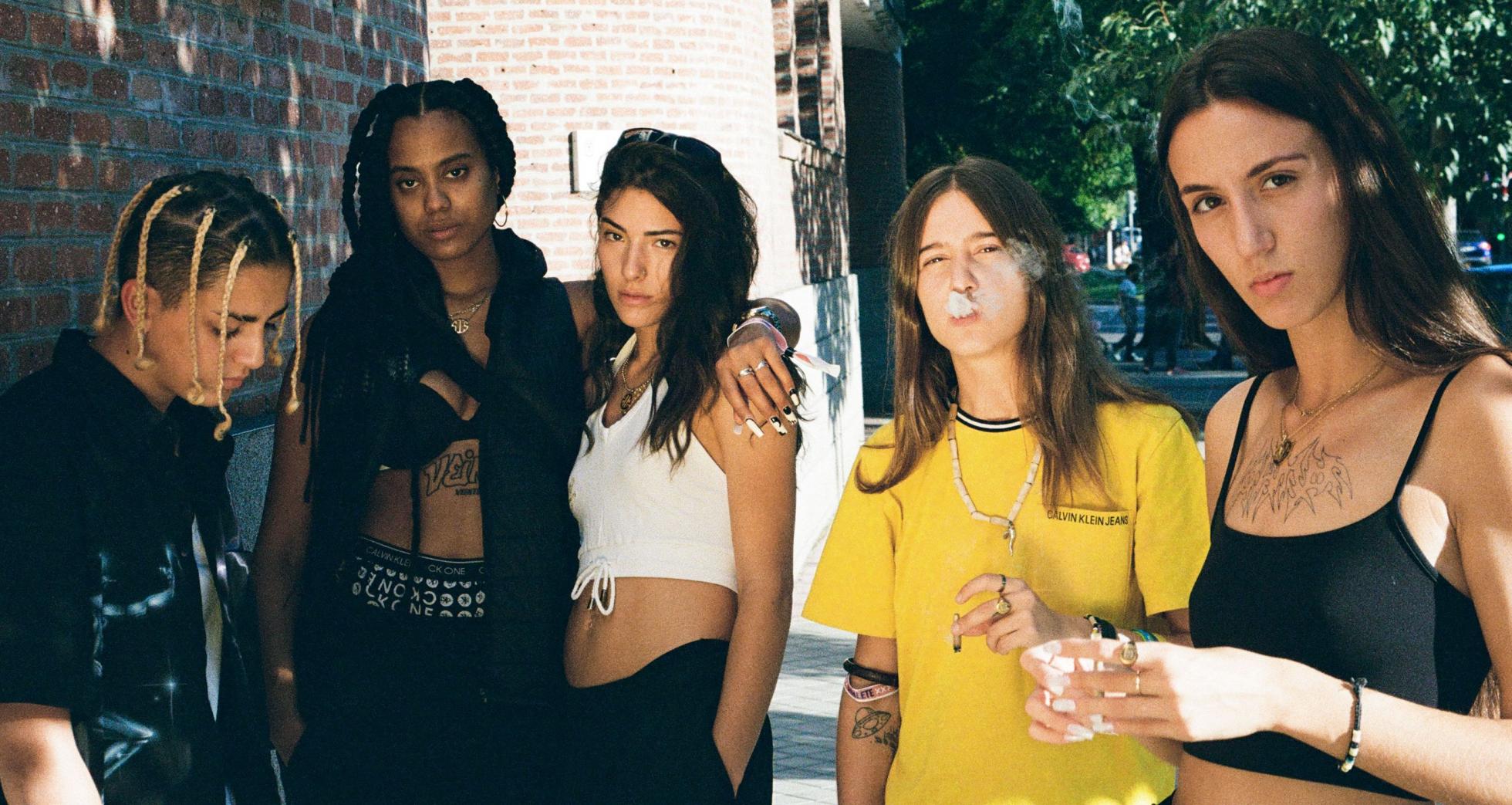
The women of the Spanish independent scene - A celebration of how eclectic and universal Spanish culture can be

Much has changed in the independent and underground musical landscape of Spain in the past 20 years. Back in the 2000’s the indie rock scene was packing festivals led by a wave of bands inspired by the post The Strokes sound, such as Love of Lesbian or Lori Meyers. At the same time, something similar was happening with the hip hop scene where artists such as Violadores del Verso or Solo Los Solo were leaving a mark on a whole generation, though in this case inspired by the classic East Coast sound. Yet, today we could say that the Spanish scene has turned its attention away from much of the aesthetics of these idols coming from the Anglo Saxon world and has gone back to celebrating how eclectic and universal Spanish culture can be.
In this new era of the Spanish music scene, artists are paying closer attention to the heritage of quinqui cinema and the greater symbiosis they experience with Latin American music markets, while at the same time permanently reaffirming the cocktail of identities to be found in Spanish cities. Female artists are also becoming more vocal in their struggle against gender gaps in the industry, as well as their support for feminism and a sense of sorority across the scene. This last element is very important because even if the Spanish scene of 2022 has powerful new models like Rosalía or Aitana, the truth is that the role of female artists in the charts of Spain still make up less than 1/5 of the total spectrum.
Luckily, these stars aren’t lonely outliers. They are the tip of an iceberg of a whole scene full of artists, many of them independent, that through their music are pushing to build a new future for the local music ecosystem. To have a first deep into it, we have prepared a list of such artists that will let you experience how eclectic and universal the female independent scene of Spain can be.
Paula Grande
“The greatest teachers that I’ve had have been my friends, whether musicians or not. If it wasn’t for their time and money I wouldn’t have been able to produce the records that I’ve been able to, or even dedicate myself to music all of these years” - Paula Grande
What happens if an artist with a long career in the spoken word manages to match the depth of their lyrical poems with a musicality of the same sort of intensity? The result is something amazing. That’s the vibe that emanes “DO’s”, the newest album and milestone in the career of Paula Grande. A record that kicks off from the lyricism of Latin icons such as Jorge Drexler or Residente (Calle 13) and makes it its own by using a back and forth between a traditional Spanish song feel, the sound of the Venezuelan cuatro, a bit of Lauryn Hill’s hip hop groove, and a refreshing measured dose of wobble basses that seem to come from the future bass genre.
Las Migas
“When I was a teenager I thought that I would be successful whenever I could play alongside known artists, such as Serrat and so. However, my triumph arrived when I realized that it was much better to have my own project, direct it, create it, compose the songs and let the rest of the world listen to it”. - Marta Robles - Las Migas
In recent years, Rosalía and C. Tangana have taken flamenco to the realm of urban pop and trap. Yet. What would be your reaction if someone took this style to the world of American country music? It sounds fascinating, right? Well, that is what Las Migas most recent track “El querer de una morena“ is all about. A great example of the special way in which this band has been able to find new edges of flamenco in the distinct corners of World Music, blending this typical Spanish genre with jazz, classical or rumba. Las Migas is the band that Marta Robles has been leading for about 30 years. A flamenco head that cut her teeth playing in the streets of Amsterdam and was able to master this musical culture, just so she could break its rules with the utmost style.
Bea Pelea
Spain is one of the main epicenters of neo perreo, an evolution of trap and reggaeton that taps on to hyper femininity and queerness to grab the cliché of the sexy girls of the average reggaeton video and turn it into a tool of female power. From this scene we’ve seen the rise of barrier breaking superstars such as Bad Gyal, and be certain that Bea Pelea is one more link that forms part of this pedigree. We’re talking about a prolific artist that besides making her career grow at a fast pace, plays a key role in the scene by producing “La Cangri”, a Barcelona based neo perreo party with franchises in London and Valencia, which is known for showcasing the “who’s who” of this new musical genre.
Mafalda
“Many of my songs, although they sound positive, they also have a dark side. I like to think that they transmit this feeling that you have when you are being isolated, when you get yourself away from everything to think. [...] We have to be able to show how we feel and feel. Joy is important and sadness, sometimes, as well.” - Mafalda
If we could imagine a Spanish equivalent of hyper pop, then Mafalda could well be one of the candidates to set up one of its templates. Born in London to Spanish parents, her unique sound started to consolidate after she dropped singing in English and made the switch to Spanish. This change made her EDM inspired pop tracks - to take a more experimental side. This led her to develop an edgy sort of indie pop that contrasts clean and melodic vocals with saturated synths and beats that bring back memories of Rustie and Hudson Mohawke’s earliest EP’s. What’s more exciting about this is that every new single seems to be getting bolder without losing Mafalda’s boutique pop style, something visible from the evolution of her latest singles “Rotos” and “Que Se Acabe”.
Safree
“I was raised amongst women, that is why I learned that a woman can support a house without any problem, that a woman can fight and craft her own destiny without any issue.” - Safree
Safree is a very special artist, an incredibly diverse MC that can jump on any sort of music, and who has become an icon for Spain’s LGBTQIA+ community over the years. Her essence comes from her down to earth approach to her art, as well as the honesty behind her lyrics. This seems to be why although she can crossover to the pop world and collaborate with a star such as Paty Cantú on “Bailando”, or explore classic Top 40 urban pop aesthetics in “Conmigo lo que quiera”, her most viral tracks seem to come from the most organic - almost bedroom like - exercises. This is the case of “Quedate a mi lado”, a song that hits right in the guts if you’re missing a person that you care of. This is also the case for “Mecánica del Corazón”, a song that became an LGBTQ+ anthem for the way it talks about the diversity in love, or even her most recently “Arte”, a song that reached the top 50 viral songs in Mexico and Colombia thanks to the audience it gathered on TikTok.
Biuti Bambú
“Everything is in constant change and evolution and we simply try to give our best version in every song, and enjoy the process wherever it may take us, but we do dream [about big things] and we dream a lot” - Biuti Bambú
It's always interesting to find out that your favorite actor plays in a band. And it's even more refreshing if you find them playing in a pop band like Biuti Bambú, whose music and energy seem to transport you back to the heart of a glorious summer day spent with your friends. Biuti Bambú is the band made by Ichi Segovia and Carla Alvarado (who is very well known for her role in Netflix’ blockbuster “La Casa de Papel”). With a relaxed vibe, the band stands out by the way the voices of Ichi and Carla intertwine in a warm solace and the way they incorporate influences from many stages of Spanish musical history. A song like “Una Buena Historia'' gives hints at their local indie and pop influences, with melodies that could remind us of classic Spanish pop acts like La Oreja de Van Gogh. However, you can clearly tell that their melomania is much broader and very much on point, especially from the exciting way in which they bring the classic 70’s summer hit “Acalorado” from Los Diablos to a new light.
Beth
“I guess what’s harder is to deal with our insecurities. Those are always there, and much more in the artistic world where it is so easy to compare yourself to others. Although is true that with time I’ve understood much better that what is important is not to stop, to do things, big or small, but to do them… and not have fear of doing mistakes, or wanting to please everybody, or setting yourself goals that are too big. But instead doing it slowly, little by little, putting love into everything you do.” - Beth
Beth was first known in the music industry by participating in the second season of talent TV show Operación Triunfo back in the early 2000’s, and then for representing Spain at Eurovision with the song “Dime” in 2003. The result of that hit was so big that her debut album was the highest selling album from a female artist in Spain that year. However, Beth’s essence seemed to be somewhere else. That is why in past years she has been working in much more intimate music on her own terms. This is something that seems to come full circle in her most recent project “Natural Women”. In this album she reunites with longtime collaborator and pianist Laura Andrés for a series of covers versions of songs from great female songwriters, played only with a piano and Beth’s voice. The result is something both soothing and powerful, with songs that feel very intimate and where she can showcase the vocal potency of her virtuoso voice.
Free Sis Mafia
Free Sis Mafia is a collective of female MC’s from Madrid that brings together Candela Cuore, Laura Siyahamba, Duku, Salvia and Huda. Five MC’s that create a very special energy when they get into the same room. Part of what stands out is that you can tell the excitement that surrounds them as they are doing their first steps in the music industry, as well as how vocal and clear they are about the importance of pushing forward as a musical sorority. The other thing that stands out is their music, and how they have managed to create their own distinctive style by using a mix of classic Spanish hip hop heritage and new Drill and Trap influences, as well as lyrics that roll back and forward between English and Spanish. This is particularly stimulating to hear in a song like "LOVEIN(2020"), which plays with contrasts in a surprising way. This feels very special as you hear the last chorus, an emotive and almost in-love chant that closes a long session of obscure and pot vibing rap cypher.


